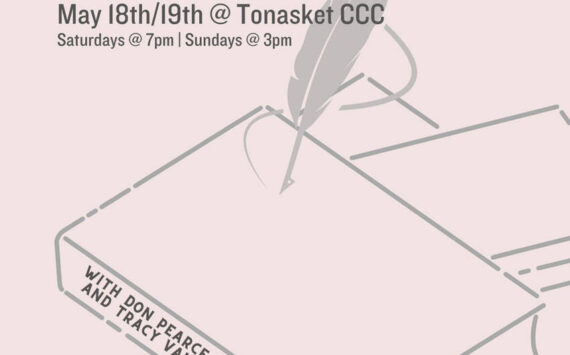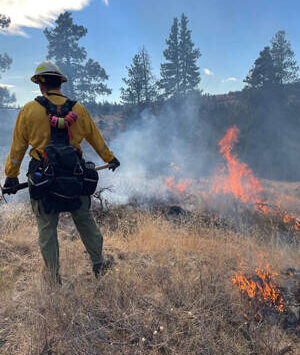TONASKET – Night time parking within the Tonasket city limits continued to be an issue for the Tonasket City Council as it heard feedback on recent efforts to enforce a parking ordinance that in some parts of town is extremely difficult to abide by.
The ordinance forbids parking on city streets from 2-6 a.m. and is particularly critical when it comes to snow removal during the winter and street sweeping during the dry months.
At issue is what do about vehicles parked on South Tonasket Ave., where a number of homes do not have driveways, an apartment dwelling has more units than parking spots and many of the residents are renters that only now are becoming aware of the ordinance.
Adding to the confusion is the “gentleman’s agreement” that has allowed residents to park on one side of the street, then move their cars to the other side after it snows to allow the plows to remove snow over a two-night period. Being a gentleman’s agreement, of course, causes its own set of problems as it’s not written into law.
“There’s been that gentleman’s agreement,” said Mayor Patrick Plumb. “It’s not in writing anywhere. It’s just an agreement with Bill (Pilkinton) and his (snowplow) crew, or the cops, or something like that, to keep the streets clean.”
Jollie Evans, one of the few homeowners along that stretch, was in attendance to express the ongoing neighborhood concerns.
“People are coming and going all the time,” she said. “So they don’t know… and even if we were to park on one side of the street all the time, there’s way more cars than spots.”
Councilmember Scott Olson said that it had been his understanding that the homeowners were going to present a written proposal to the council to give them a starting point in revising the ordinance into something that would be workable as written.
“(As written) there is no parking on ANY street between two and six in the morning,” he said. “That’s why we’re asking you to come to us. Our solution is for you to come to us as a neighborhood with a workable solution, and we can go from there. Until that point we’re going to encourage the police officers to enforce it when there’s going to be snow so the public works department can clear the streets.”
Police chief Robert Burks said that at this point the department is not ready to write tickets along Tonasket Ave. for that particular issue.
“Just because Bill comes out when it snows you’re not going to get a ticket,” he said. “He’ll give us a list (of cars that are parked on the street) and we’ll contact them and ask if you could move to the other side. If you don’t have anywhere to go we can come up for some place for you to park so Bill can come out and plow where those people were.
“It’s the same old thing, and it’s the reason why we’re going over all the ordinances.”
“We realize there’s a situation where people don’t have options,” said Councilmember Jill Vugteveen. “Bill and Rob are willing to work with the neighborhood to do what we need to do.”
“Until (the council) comes up with a solution,” Pilkinton said, “everyone should park on the west side of the street. Then if we get a heavy snow they can move to the east side (for the second round of plowing.)”
“We’ll be addressing this,” Plumb said, emphasizing that the discussion only pertained to S. Tonasket Ave., and not other areas in town. “For now I hope we can have peace for two weeks.”
Of course, parking was far from the only topic of the three-hour meeting.
During public comment, Brandi Clark brought to the board’s attention that some ordinances governing animals don’t address actual issues that are occurring in town. Clark’s 15-year-old son had recently been attacked by a large dog that dragged its doghouse into the street to come after him, but because his injuries did not involve his skin being broken, they didn’t fit under the city’s definition of “severe.”
“The city codes say it was not ‘severe,'” Clark said. “The definition states you would have to have broken bones, sutures, or reconstructive surgery … my sons injuries, if a human had done that to my son, he would be in jail.
I would just like the ordinance adjusted to redefine ‘severe’… it concerns me because that is a walking route for a lot of younger children. It could have been very, very severe. I’m happy that everything was handled as written; I just wish it had been written differently.”
Police Chief Robert Burks talked of the frustration of dealing with animal issues under the current code.
“What’s frustrating for us — a dog at large is an infraction and we can’t write that unless we actually see the dog. Now we’ve got a dog bites a kid, and all you can get is a piece of paper that warns you what will happen if it happens again.
I’m wondering if there is some kind of legal way to come up with a fine, if you get a potentially dangerous dog notice, you also get a fine… like a $500 ticket would make you keep track of your dog or get rid of your dog.”
Plumb said that resolving issues with the code would probably be most appropriately handled by the public safety committee, which has already started the process of reviewing all of the city code.
“If we hash this out here we’ll end up banning all dogs from town or saying there are no rules,” Plumb said. “We need to address fixing it; I’ve had issues with this code myself … we haven’t gotten to (this part of the code yet), but when we get there I’d like you to be here for any of these discussions, because I appreciate you (Clark) being here and going what you’re doing…
“Law enforcement is asking for some clarity, and they need it for when they go out in public and explain this. It’s a lot of wordage for a dog.”
Also as part of public comment, Roger Rylander reiterated a long-held desire to have an emergency truck escape ramp put in on Highway 20 heading into town, but felt that someone other than he needed to spearhead the project due to a conflict of interest on his part.




